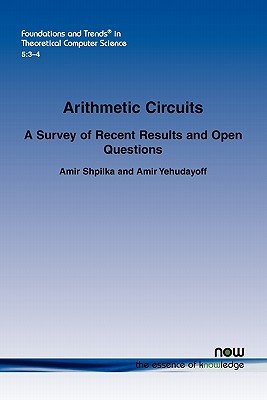
- We will send in 10–14 business days.
- Author: Amir Shpilka
- Publisher: Now Publishers
- Year: 2010
- Pages: 194
- ISBN-10: 1601984006
- ISBN-13: 9781601984005
- Format: 15.6 x 23.4 x 1 cm, minkšti viršeliai
- Language: English
- SAVE -10% with code: EXTRA
Reviews
Description
A large class of problems in symbolic computation can be expressed as the task of computing some polynomials; and arithmetic circuits form the most standard model for studying the complexity of such computations. This algebraic model of computation attracted a large amount of research in the last five decades, partially due to its simplicity and elegance. Being a more structured model than Boolean circuits, one could hope that the fundamental problems of theoretical computer science, such as separating P from NP, will be easier to solve for arithmetic circuits. However, in spite of the appearing simplicity and the vast amount of mathematical tools available, no major breakthrough has been seen. In fact, all the fundamental questions are still open for this model as well. Nevertheless, there has been a lot of progress in the area and beautiful results have been found, some in the last few years. As examples we mention the connection between polynomial identity testing and lower bounds of Kabanets and Impagliazzo, the lower bounds of Raz for multilinear formulas, and two new approaches for proving lower bounds: Geometric Complexity Theory and Elusive Functions. The goal of this monograph is to survey the field of arithmetic circuit complexity, focusing mainly on what we find to be the most interesting and accessible research directions. We aim to cover the main results and techniques, with an emphasis on works from the last two decades. In particular, we discuss the recent lower bounds for multilinear circuits and formulas, the advances in the question of deterministically checking polynomial identities, and the results regarding reconstruction of arithmetic circuits. We do, however, also cover part of the classical works on arithmetic circuits. In order to keep this monograph at a reasonable length, we do not give full proofs of most theorems, but rather try to convey the main ideas behind each proof and demonstrate it, where possible, by proving some special cases.
EXTRA 10 % discount with code: EXTRA
The promotion ends in 22d.12:28:49
The discount code is valid when purchasing from 10 €. Discounts do not stack.
- Author: Amir Shpilka
- Publisher: Now Publishers
- Year: 2010
- Pages: 194
- ISBN-10: 1601984006
- ISBN-13: 9781601984005
- Format: 15.6 x 23.4 x 1 cm, minkšti viršeliai
- Language: English English
A large class of problems in symbolic computation can be expressed as the task of computing some polynomials; and arithmetic circuits form the most standard model for studying the complexity of such computations. This algebraic model of computation attracted a large amount of research in the last five decades, partially due to its simplicity and elegance. Being a more structured model than Boolean circuits, one could hope that the fundamental problems of theoretical computer science, such as separating P from NP, will be easier to solve for arithmetic circuits. However, in spite of the appearing simplicity and the vast amount of mathematical tools available, no major breakthrough has been seen. In fact, all the fundamental questions are still open for this model as well. Nevertheless, there has been a lot of progress in the area and beautiful results have been found, some in the last few years. As examples we mention the connection between polynomial identity testing and lower bounds of Kabanets and Impagliazzo, the lower bounds of Raz for multilinear formulas, and two new approaches for proving lower bounds: Geometric Complexity Theory and Elusive Functions. The goal of this monograph is to survey the field of arithmetic circuit complexity, focusing mainly on what we find to be the most interesting and accessible research directions. We aim to cover the main results and techniques, with an emphasis on works from the last two decades. In particular, we discuss the recent lower bounds for multilinear circuits and formulas, the advances in the question of deterministically checking polynomial identities, and the results regarding reconstruction of arithmetic circuits. We do, however, also cover part of the classical works on arithmetic circuits. In order to keep this monograph at a reasonable length, we do not give full proofs of most theorems, but rather try to convey the main ideas behind each proof and demonstrate it, where possible, by proving some special cases.


Reviews